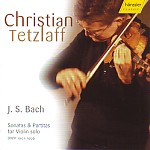Because Christian Tetzlaff’s 1993 Virgin Classics release of Bach’s Sonatas and Partitas ranks among these works’ reference recordings, collectors might be curious as to how the violinist’s 2005 Hänssler remakes measure up. In general, Tetzlaff’s stylish, sophisticated, and innately musical conceptions remain recognizable. However, details of phrasing, articulation, and dynamics are sharpened, internalized, and freed up. Wider dynamic contrasts demarcate certain sectional repeats and echoed phrases. Sequential arpeggios and scales ebb and flow with greater fluctuations in tempo and harmonic pointing, notably so in the great D minor Chaconne.
In 1993 Tetzlaff understandably stretched a beat or two in the fugues to accommodate and clarify broken chords. He now shapes those figurations around a steady underlying pulse without cramping his style or sounding the least bit reined in. A few specific examples might further help listeners pinpoint Tetzlaff’s Bachian evolution.
The 1993 G minor Presto (Partita No. 1’s finale) is brisk, suave, and rock steady, with subtle differentiation between sustained and detached phrasing. These differences are more pronounced in the remake, abetted by shorter phrase groupings and stronger accents. By contrast, the B minor sonata’s Presto remains brisk and virtuosic yet scintillates less. Tetzlaff now scales the C major sonata opening Adagio’s cruelly exposed “duet” writing down to a raspy whisper at the outset, gradually opening up his tone and gathering momentum as the piece unfolds.
So now, the tough question: which Tetzlaff Bach cycle to buy? If money’s an object, Virgin wins hands down, simply because the label bundles Tetzlaff’s Sonatas and Partitas together with Ralph Kirshbaum’s excellent Bach Cello Suites in a budget box that costs much less than the present release. As for sound quality, it’s a toss-up: Hänssler’s bright, vivid, and close-up sonics contrast to Virgin’s more resonant, rounded, and slightly warmer ambience. In all, this is a major release from a major violinist, even if the now 40-something Tetzlaff may yet deliver his last words on the subject of unaccompanied Bach. [5/7/2007]
































